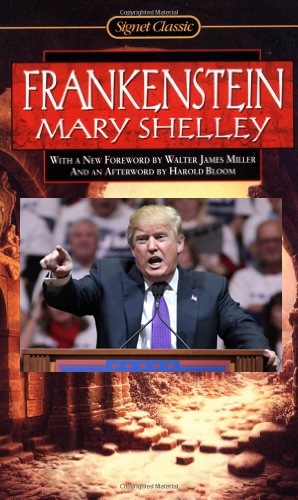OCTOBER 23, 2024 – For book club this month—the month of Halloween—our group is reading Frankenstein by Mary Wollstoncraft Shelley. You all know the story[1]—man creates uncontrollable monster.
Last summer the sequel was published under the title, Apprentice in Wonderland: How Donald Trump and Mark Burnett Took America Through the Looking Glass, by one Ramin Setoodah. Recently, I heard Mark Burnett interviewed about the story behind the exposé. As he apologized to the country for the monster he’d created in the Emperor [and his] New Clothes, I couldn’t help but think of Victor Frankenstein, Mary Shelley’s obsessional character who brought to life and gave his name to one of the leading stars of every Halloween since.
To hear Mr. Burnett describe the reality TV show, The Apprentice—the platform for the grotesque figure behind the famous phrase, “You’re fired!”—is to understand in a nutshell how we as a nation found our way to making ourselves . . . well, not so great . . . still.
This revelation is consistent with what is great about our country and that’s our capacity for self-examination and self-criticism, which are the ultimate hallmarks and purpose of the First Amendment. Without free and open speech and discourse, you can’t have self-examination/self-criticism, and without those traits, a society can never hope to be truly great.
The whole construct of The Apprentice was quintessentially American, and I’m not thinking of something exemplary. For all our positive qualities, among our leading negative ones is superficiality. This characteristic is fed and hyped by our penchant for marketing, which is driven by our compulsion “to have everything—now!” That impulse, in turn, is an inevitable outcome of a free market, wherein value is too often a function of what glitters to the eye, not what glows in the heart or grows in the mind. The Apprentice captured deftly this impulse in our nation’s culture.
According to Mark Burnett, the producers of The Apprentice knew darned well that they couldn’t find a real CEO, an authentic businessperson who would have the time for such an outlandish show, the booby prize of which (for the CEO or businessperson, anyway) was to have the “apprentice” follow him/her around all day like a bad shadow. But then there was this self-promoting celebrity-seeking guy, Donald Trump, who had a gazillion LLCs and lots of inherited money and real estate and could thus pass for a “business executive.” Plus, he had the voice, especially when uttering the words, “You’re fired!”
It was success of The Apprentice—as a TV reality show—more than any of Trump’s other dubious attributes that launched his presidential ambitions. Prior to that stroke of good luck (for him, not the nation), Trump’s gross appetites and behaviors, sociopathy and narcissism played out in New York City and New Jersey and occasionally elsewhere, with spectacular upsets—the casinos hitting the financial skids, a failed real estate development in Chicago come to mind, and the deflation of Trump University come to mind. With newfound fame and notoriety gained from his staged boardroom theatrics in The Apprentice, he was ready for something bigger and bolder.
Obama’s roasting of Trump at the 2011 White House Correspondents’ dinner melded Trump’s megalomania with his psychological fragility. In that moment, America’s Frankenstein—the monster—jumped to life.
He has been on the loose ever since, bounding across the landscape, creating the same acute fear and loathing in the creator of The Apprentice that Victor Frankenstein’s monster struck in his maker.
Frankenstein’s creation became a monster because decent people reacted with horror to his gross deformity. Likewise, Burnett’s monster went totally rogue because decent people rejected Trump’s deformed personality and another set of people saw an opportunity to leverage his destructive nature—for their personal aggrandizement, not the community good. People dissatisfied with their lives, fearful of change, confused in their reasoning, susceptible to the pitches of charlatans, fixated on their upper-end tax bracket, convinced that God works in really mysterious ways, or just plain impatient with the sausage-making inherent in a pluralistic democracy, were well disposed to “burn the house down” to remedy its perceived defects and deficiencies. In Trump they found their man, their monster with the (apparent) money and power to trash the status quo. And he’d do it not with matches and gasoline but by searing heat from the friction of his monstrous personality against all sides of the establishment and anyone who didn’t exhibit unqualified loyalty.
Where will it all end? Time will tell, though I fear that time won’t be November 6 or December 6 but perhaps on January . . . Let’s not go there yet. Meanwhile, read, study and ponder Frankenstein, the book.
Subscribe to this blog and receive notifications of new posts by email.
© 2024 by Eric Nilsson
[1] But have you read it? I hadn’t until now. Before this month I had only a vague notion of the tale—that “Frankenstein” was the surname of the monster’s creator, some kind of mad scientist. The story is far more complex than I’d assumed or could begin to appreciate. I now understand why it achieved and maintained its status as a classic. Compressed in length (the Signet Classic paperback edition I have is 198 pages plus foreword, preface and afterword), the novel must be digested slowly to be .
